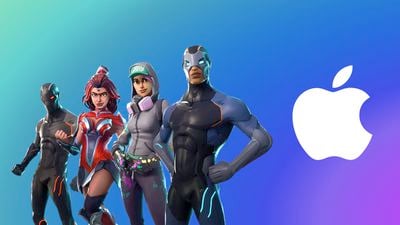Ahead of its upcoming bench trial against Epic Games, Apple today filed 500 pages of documents covering findings of fact and conclusions of law, which basically summarizes the information exchanged between Apple and Epic, presents the relevant facts to the judge, and argues for the logical conclusions that should be drawn when law is applied to the case.

Apple sticks to many of the talking points that it has argued since the beginning of its dispute with Epic Games. The App Store has remained unchanged in terms of general fee structure since it first debuted in 2008, and while policies have been updated, the development principles have remained the same.
Apple sees Epic's challenge as an attack on its fundamental App Store business model of 13 years. Apple maintains that its rigorous review guidelines for apps provide consumers with security, privacy, and reliability, something that its devices are also known for, leading to significant benefits for end users and developers.
The 30 percent fee that Apple charges is in line with the fees charged by other app marketplaces and software providers as demonstrated in a study that Apple had commissioned earlier this year, and Apple recently introduced the Small Business Program to drop fees to 15 percent for developers making under $1 million annually. Apple entered a market where 30 percent commissions were already accepted -- it did not set that rate when the App Store launched.
In response to claims that the App Store is anticompetitive because there are no alternate app stores allowed on the iPhone, Apple points to competition in the device and game transaction markets. There are other platforms that people can choose, along with other gaming options, and web apps are supported on iPhone and iPad as gaming alternatives that Microsoft and Google have already taken advantage of. Apple uses Epic's main title, Fortnite, to illustrate its point.
Epic's flagship game, Fortnite, illustrates the competitive landscape. Apple supports "cross-plat- form" play and cross-platform transactions. The same consumer can make in-app purchases of V-Bucks on her iPhone (through the browser) during a lunch break, and on a console at home in the evening. Apple (unlike some of its competitors) allows "cross-wallet" play, so that in-game purchases--called V-Bucks in Fortnite--can be made on one device and used on another. In other words, an iOS user can purchase V-Bucks on a PC and then (prior to Fortnite's removal) use them in Fortnite on their iPhone or iPad--with Epic owing not even a penny's commission to Apple.
Epic internal documents related to "Project Liberty" suggest that Epic has been plotting against Apple and Google since 2018. Epic began Project Liberty when it saw a decline in its average monthly active users and revenue, devising a strategy to pay less commission while still taking advantage of the benefits of the App Store and the money that Apple has invested into the ecosystem.
Epic Games hired lawyers and a PR firm as part of its plan to launch a lawsuit against Apple, ultimately shelling out hundreds of thousands of dollars. Epic outlined its plan to get Fortnite approved with hidden alternate payment options, which was then activated by a hotfix, leading to the current dispute. Epic internal documents described the legal battle against Apple and Google as "fun!" and contemplated how to get Apple and Google to reconsider their fees without Epic Games looking like "the baddies."
This was all part of a pre-planned media strategy called "Project Liberty." Epic retained Cravath, Swaine & Moore LLP and a public relations firm in 2019, and this lawsuit is the culmination of that effort. Epic seeks to portray Apple as the bad guy so that it can revive flagging interest in Fortnite. Yet, ironically, when Epic got kicked off the iOS platform, it told players that they could continue playing on consoles, PCs, and other devices--demonstrating the existence of competition and the absence of monopoly.
Tim Sweeney, the CEO of Epic Games, has confirmed Project Liberty in prior interviews and has said that Epic spent months preparing the lawsuit against Apple, though Apple's court filings provide new insight into the lengths that Epic went to in order to rope Apple and Google into an antitrust lawsuit.
Apple argues that an expansion of antitrust law is unwarranted and that Epic's product market descriptions are inaccurate because of the other platforms the App Store is competing with. Apple claims that Epic overstates the App Store's profitability, and that arguments that the review process is ineffective are inaccurate. Last year, Apple rejected 150,000 apps, and malware on iOS devices is almost unheard of compared to the high number of malicious apps found on PCs and Android devices.
Apple says that Epic's claim that the market is only iOS apps will fail, and that the relief that Epic seeks would be harmful for consumers and developers as it would weaken the App Store. Apple also sees the App Store as an integrated feature of the iPhone and in-app purchase as an integrated feature of the App Store that does not allow for third-party payment options, which is what Epic is aiming for.
At bottom, Epic is asking this Court to force alternative terms on Apple so that Epic can make more money. But Epic's request would harm other developers and consumers, in addition to imposing unprecedented obligations on Apple to open its proprietary systems and engineering to third parties.
The Epic v. Apple bench trial is set to start on May 3, and it will conclude the week of May 24. Both Epic and Apple will call high-profile witnesses, including Apple CEO Tim Cook, Apple Fellow Phil Schiller, Apple engineering chief Craig Federighi, and former iOS software chief Scott Forstall, who will be testifying on behalf of Apple.























